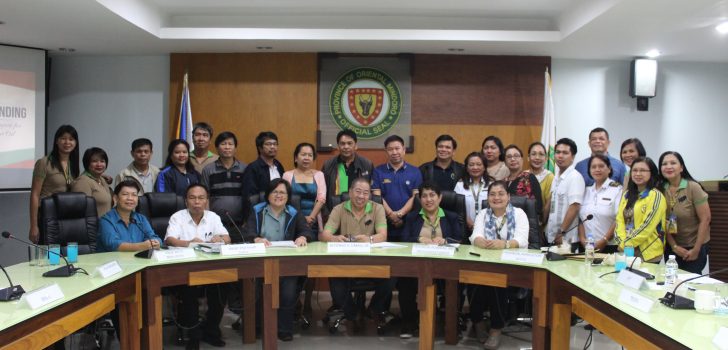 Attendees of the interagency convergence meeting for the Oriental Mindoro’s virgin coconut oil industry strike a pose after the presentation and discussion. (Photo by Leira Vic Colongon, DA-PRDP MIMAROPA RPCO InfoACE Unit)
Attendees of the interagency convergence meeting for the Oriental Mindoro’s virgin coconut oil industry strike a pose after the presentation and discussion. (Photo by Leira Vic Colongon, DA-PRDP MIMAROPA RPCO InfoACE Unit)
Agencies commit to boost Oriental Mindoro’s VCO industry
As the Philippine Rural Development Project (PRDP) progresses in its implementation, the importance of institutionalization of its tools reaches a new level.
The Provincial Commodity Investment Plan, in particular, which is sourced out from the Value Chain Analysis (VCA) of commodities, is one of the most practical instruments or basis to determine systematic provision of government and non-government interventions.
Oriental Mindoro, one of the provinces of the MIMAROPA region, has already piloted an interagency convergence for the calamansi industry. The interagency convergence aims to centralize the issues being faced by particular agricultural industries and come up with action plans to resolve them.
This time the local government through the Provincial Project Management and Implementing Unit (PPMIU) prioritizes the coconut industry in their PCIP with focus on virgin coconut oil (VCO).
In 2012, Oriental Mindoro produced a total of 130,224.30 metric tons of coconut from 745,488.54 metric tons of husk produced by the whole region. However, according to the Philippine Statistics Authority, this rate is slowly going down.
On the other hand, virgin coconut oil or VCO, is one of the highly in demand oils in the local and international market. This is because, compared to the ordinary coconut oil, the VCO is proven to have more health benefits. To maximize this opportunity, entrepreneurship is a rational step for coconut stakeholders.
“All programs are continuously being implemented. Not just the road, not just the training on new technologies, but we are also now studying the marketing side. The farmers will benefit from this, especially our coconut farmers,” said Provincial Governor Alfonso Umali Jr. or Oriental Mindoro.
As a widely known commodity in the Philippines, coconut is abundantly produced in MIMAROPA particularly in the provinces of Oriental Mindoro, Romblon, and Palawan. It is considered one of the priority commodities of the region.
In this convergence meeting, agencies commit to help the coconut industry by signing a Memorandum of Understanding (MOU), a binding document which the PRDP initiated for a more concrete collaboration between agencies. “Through this MOU, we hope that our needs and priorities that need funding are mainstreamed through the different agencies that are involved here. This is to further enhance the coconut industry of Oriental Mindoro,” said MIMAROPA I-PLAN Component Head Marilyn Bienes.
The signatories of the memorandum include the bureaus, attached agencies, and corporations of the Department of Agriculture such as the Bureau of Soils and Water Management, Bureau of Plant Industry, Bureau of Agriculture and Fisheries Standards, Agricultural Training Institute, Agricultural Credit Policy Council, Philippine Crop Insurance Corporation, Philippine Center for Postharvest Development and Mechanization, Philippine Coconut Authority, and Regional Agriculture and Fishery Council.
Other national agencies, through their regional counterparts, include the Department of Science and Technology, Department of Trade and Industry, Department of Agrarian Reform, Department of Labor and Employment, Department of Environment and Natural Resources, Department of Interior and Local Government, Department of Public Works and Highways, Philippine Statistics Authority, Food and Drug Administration, National Commission on Indigenous People, Cooperative Development Authority, Land Bank of the Philippines, and Technical Education and Skills Development Authority. The Mindoro State College of Agriculture and Technology representing the academe, is also one of the signatories.
The presented list of interventions for virgin coconut oil during the said convergence meeting will address particular issues on insufficient input support for coconut, risk of pest, insufficient working capital, poor road areas, low adoption of modern production technology, and limited entrepreneurship capabilities. ### (Leira Vic Colongon, DA-PRDP MIMAROPA RPCO InfoACE Unit
